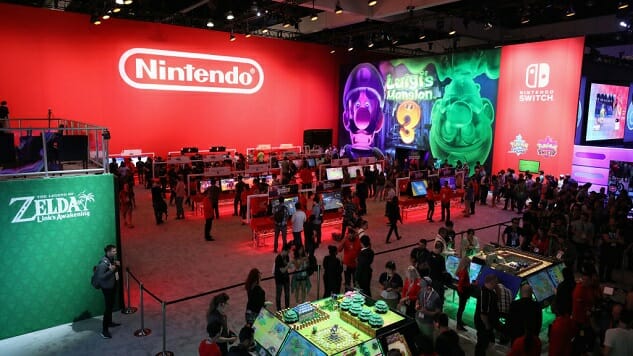E3’s Identity Crisis Leaves It With an Unclear Future
Photos courtesy of Getty Images Games Features E3
Every year the Entertainment Software Association puts on the Electronic Entertainment Expo, also known as E3. It is a dizzying, over-the-top display of the latest and greatest in videogame hardware and software, packed with two entire show floors, dozens of vendors, manufacturers, and developers, and hundreds of games. It’s the beating hub of the part of the videogame industry that loves to wear suits and awkwardly hang out with celebrities.
Tucked into one corner of the showfloor is the Indiecade booth, which showcases small games by smaller developers. It’s in the shadow of the gargantuan Nintendo booth (multiple stories, about the size of a small building, packed with every big ticket game that Nintendo could show on the floor) and feels like an oasis of sorts, an island of relative calm and genuine nature among the storm and tumult of larger developers and publishers.
As I spent some time there during the conference, several developers remarked on the relative emptiness of this year’s E3. Indeed, right behind the Indiecade booth was a gaping hole in the showfloor’s residencies, a bare and barely-lit patch of carpet that some Indiecade presenters had taken to calling the “yoga room,” since the expanse of carpet was ideal for individual stretching out or, in the case of some exhausted attendees, just laying down for a minute.
E3 has had a weird year. The conference is traditionally frontloaded with a number of press conferences from major publishers—Nintendo, Ubisoft, and the like. But earlier this year, longtime industry stalwart Sony announced that they would be forgoing their press conference at E3. EA, who pulled out of the actual E3 show a few years ago, also scrapped its press conference this year.
The place of E3 within the games industry is undeniably changing. Both EA and Sony have their own events where they can showcase their latest work without competition (EA Play and PSX, respectively). It’s been a few years since the event started letting the public in (via highly-priced “Gamer” passes), and it’s a far cry from being a strictly trade-and-vendor show as it would have appeared in the 1990s. But it still doesn’t feel quite adjusted to its new partial identity as a consumer-focused event.
Alongside traditional publisher booths and closed-door offices on the show floors, this year at E3 sported the Fortnite, eh, pavilion, complete with cosplaying dancers, prizes, game shows, and inflatable attractions. Two different energy drinks had competing DJ stages, lines for Nintendo public demos reached over three hours long, and a VR startup brought pole dancers. Who this was meant for largely remains a mystery, since any actual industry business was likely done in separate, back rooms and the public (from what I saw) didn’t seem to have much interest in bodysuited pole dancers (however: if you were one of those dancers and you’re reading this, there’s no shame in getting that paycheck, and I hope the music didn’t get too annoying after the fifteenth loop).
As my first time at E3, this year felt like a confluence of two different events. The first, the industry event with offices and salespeople and PR agents and press supplies, confilcted with the second, which was the one that had throngs of neon-ticketed public in cosplays and donning enormous swag bags that they received from checking out the latest new games.
Neither interpretation is necessarily “worse” than the other—events like PAX have always billed themselves as consumer/gamer-focused, with less announcements and behind-closed-doors meetings than “industry” events like E3 and the Game Developers Conference, and there are certainly other festivals that focus on the fan communities around games instead of on the industry themselves. The question is, where will E3 be after this year?
The economic rationale to congregate announcements “as an industry” into a major event is generally more useful when the companies announcing new projects do not have the means to garner attention on their own. But with EA, Sony, Nintendo, and others regularly throwing their own events to announce projects, the usefulness of E3 suddenly comes into question.
Judging by this year’s event, it feels likely that future years may lean further into the attendance of the public, and let some of the major announcement momentum of the event fall by the wayside. This feels mournful in an odd way, the passing of one era of games to another. But when each major publisher can brag about their works on their own time, why line them up so that they compete with everyone else’s?
It seems likely that whatever the next few years and/or decades will look like for E3, they’ll be different than this current incarnation that we know now, with huge announcements by every major publisher. Perhaps the future of E3 looks more like that Indiecade booth, with a multitude of smaller developers and a lower entry cost to showing games. Or maybe it will take a turn toward a fan-centric convention like PAX, with less industry dealings and more events for the con-going public. It’s not clear where E3 is headed, and it likely won’t be for a while.
But the “yoga room” was a strange sight on the showfloor, and not something that I expected as a first-timer, especially in such close proximity to higher-pedigree booths. Sometime this year at E3, someone probably did do yoga on that carpet. I wonder what they’d think about Gooigi.
Dante Douglas is a writer, poet and game developer. You can find him on Twitter at @videodante.